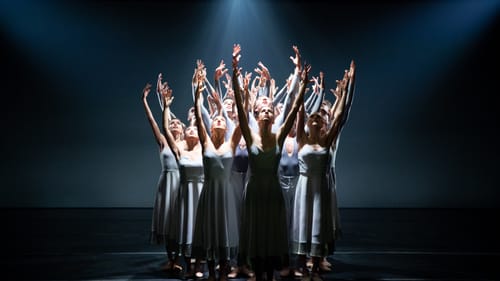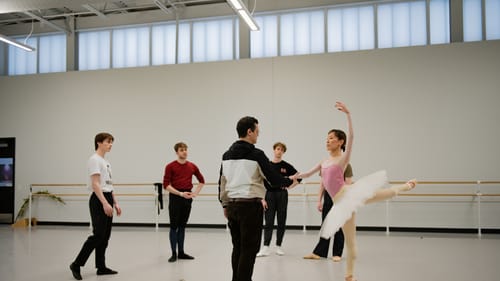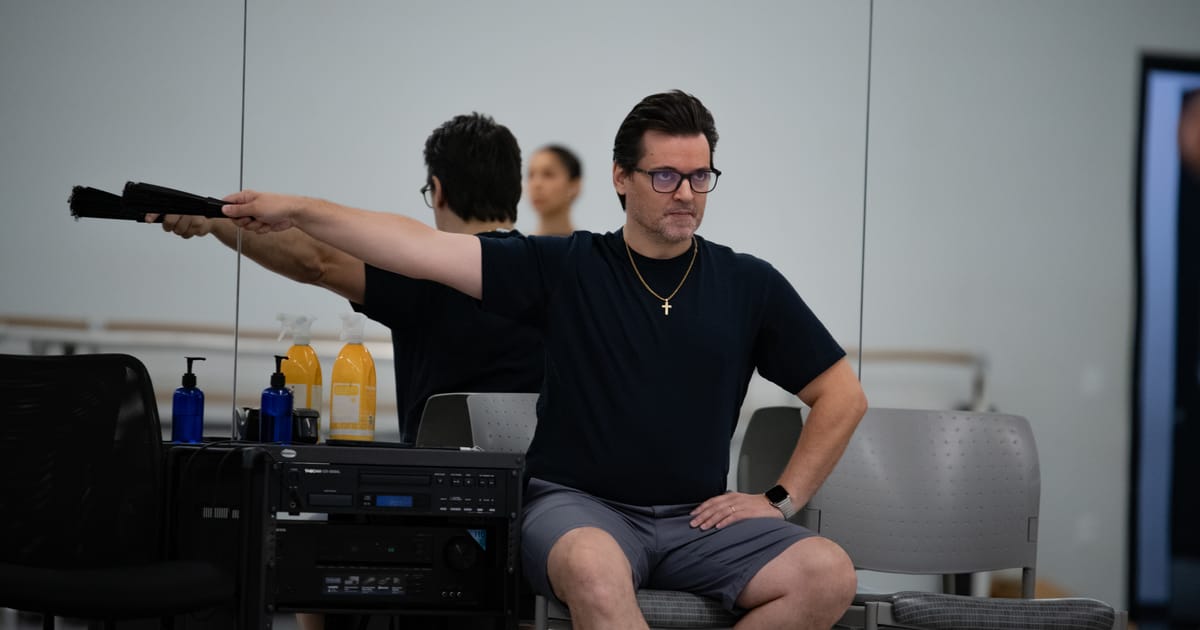Philadelphia Ballet opens the second year of its 60th anniversary season with a revamped production of Le Corsaire, and artistic director Angel Corella says plenty of changes are on deck for the story (more on that below). I was glad to hear it, but as I sat down with Corella to talk about his decade at the helm, I wanted to learn more about his journey as a leader and a choreographer.
Despite its glamor and glitz, the company had fallen into financial disaster in the past, and in 2014 it was on the downslide again. It needed an artistic director who could bring the excitement back to the stage and the donors back to their checkbooks. “We needed fresh blood,” board chair David Hoffman told me in in 2020, “and Angel was a star of his generation in dance. [He] remembers every part of every ballet he’s ever been in or seen, and he is a tremendous teacher.”
“You can’t please everyone”
For Corella, the Philadelphia Ballet seemed a perfect match: he knew the company and had visited it regularly when his sister, Carmen, danced here. But changing a company’s direction is never easy. While Corella charmed donors, there was trouble behind the scenes. In his 20-year career, he said he’d never experienced that kind of rejection.
“I even heard from one of the dancers, ‘we will get rid of you the same way that we got rid of [former director Kaiser] Roy,’ so I was like, ‘ooow. That’s a little bit much!” In hindsight, Corella admits, “I was kind of naïve.” He’s a people pleaser by nature, he said, and “it was really difficult for me to understand that you can’t please everyone.”
Ten years later
Since that contentious beginning, Corella has turned the company around with vivid dancing in a mix of newer works, lots more classical story ballets, and enough Balanchine to tie the company back to its roots. But he said that his own greatest talent is recognizing it in others: not just his dancers, but also Brazilian artist Juliano Nunes, who served as the ballet’s resident choreographer for two seasons beginning in 2021. “To be able to see the talent so clearly, so quick, that was great,” Corella remembered, plus “being able to grab him before everyone else.”
And he’s proud of his 2023 Carmen, which was a turning point for him. After the 2021 performance of his Landscaping the Mist at the Performance Garage (the company’s soft return thanks to Covid vaccine rollout), he said that he’d created the piece because they had a hole to fill in the program. He was more comfortable staging the classical ballets and didn’t consider himself a “real” choreographer. Now, with a full-length story ballet of his own and another major piece, Bolero, set for the spring, he says, “I have to eat my words now. I surprised myself.”

Ballet in the pandemic
In March of 2020, the company was in the middle of its run of Bayadère
when the order came to shut down the theaters. It was dancer Nayara Lopes’s first time doing the show. “I remember very clearly because she started to cry,” Corella said. “She had been working so hard and she was ready to do it, and we had to say we’re not performing tonight.”
When everyone realized that the Covid shutdowns would last more than a week or two, the company pivoted to at-home and digital. “It was crazy,” he told me. “You might see a dancer jumping and doing turns a la second [a turn with the leg extended] over the sofa, like, literally brushing the sofa. Nick Patterson was doing a double tour, and he hit his head on the ceiling, and I was like, oh my God, they’re going to kill themselves! And he was like, ‘I’m okay, I’m okay, I’m okay.’ Just be careful, okay? Measure where you are!”
The company stayed in the public eye with past performances on video and a series of digital performances, created with the dancers in those well-remembered pods for safety and recorded at the Performance Garage. But years of plans for a new building were on hold again, and efforts long in the works to tour the company abroad evaporated. Then, on the advice of a marketing company, the ballet chose that moment to rebrand itself, changing its name from the Pennsylvania Ballet to the Philadelphia Ballet. (The switch drew a mixed response in the dance world.)
Work-life balance
Some challenges have been joyful, even in a pandemic. Four years ago, Corella and company dancer and choreographer Russell Ducker were married. (We’ll be seeing Ducker’s choreography in Dance Card later this season.) The couple has been together for more than 17 years, with a house in the burbs and a dog. Still, Corella is sensitive to navigating the professional part of the relationship in the public eye. Sometimes, he said, “I balance it out in the wrong way, because he’s my partner, and sometimes I don’t give him as many opportunities as he deserves, because I don’t want people to feel that I’m [showing] favoritism.” The company is a low-drama environment these days, he said, with lots of couples among the principal dancers.
The future of Philadelphia Ballet
Corella’s new take on Le Corsaire (running October 18-26, 2024 at the Academy of Music) opens the season. It’s a complete revamp of the story that keeps the fun of the fantastical 19th-century ballet but jettisons many of the bits that made us wince (here’s my review of Corella’s 2017 version). Lankedem is now arranging a wealthy marriage for his sister Medora, who is smitten with the pirate Conrad. So there will still be rollicking pirates and close escapes and swoony duets. The faithful servant Ali will doubtless steal Act 2, but no villains will be bowing to Mecca. And according to Corella, the new story is easier to follow.

As for the future, Corella is looking forward to the company’s new building on North Broad. It has been on the drawing board since 2007, but changing plans and finances left the space a vacant lot until this year. During the pandemic, however, the need for the added space became painfully clear, and construction is now underway. And the company is once again putting out feelers for international touring: there’s been interest in Carmen.
Corella has another hope for the future. He has his eye on productions we haven’t seen here, like Onegin, or Manon or The Merry Widow, but he’s having a hard time making that happen. Some are expensive, and the marketing department worries that they are not as well known. The company increasingly relies on the classic story ballets to bring in audiences, but much as we love them, we can weary of a constant diet of Cinderella or even Giselle. The point of bringing Corella on board was to shake things up, and hopefully the donors—and the audiences—will step up to let him do it again.

